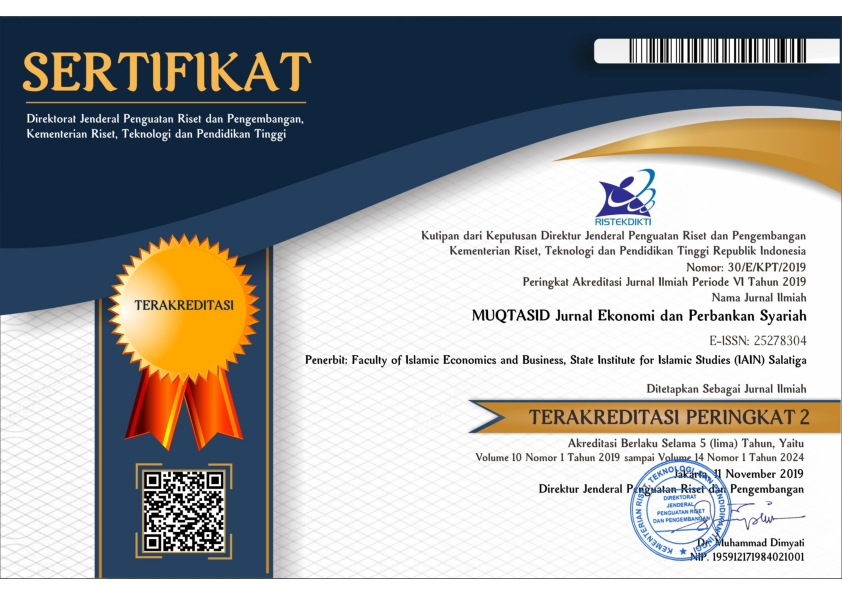The Efficiency of Zakat Management Organizations in Indonesia: Data Envelopment Analysis Approach
Abstract
Abstract
Efficiency can be defined as the ratio between output and input. A company is said to be efficient if it can produce greater output when compared to other companies that use the same amount of input. Or produce the same amount of output, but the number of inputs used is less compared to other company inputs. This study aims to analyze the efficiency of Zakat Management Organizations (ZMO) in Indonesia and to find sources of inefficiency of Zakat Management Organizations (ZMO). The method used is Data Envelopment Analysis (DEA) using software called Banxia Frontier Analyst (BFA). The analysis concluded that based on CRS assumptions, there were 7 DMUs that had achieved efficiency with a score of 100%. The seven DMUs are BAZNAS 2018, PKPU 2015, PKPU 2016, Rumah Zakat 2016, Rumah Zakat 2017, Rumah Zakat 2018 and Yatim Mandiri 2016. Meanwhile, with the assumption of VRS, there are 9 efficient DMUs namely BAZNAS 2015, BAZNAS 2018, PKPU 2015, PKPU 2015 2016, Rumah Zakat 2015, Rumah Zakat 2016, Rumah Zakat 2017, Rumah Zakat 2018, and Yatim Mandiri 2016. Sources of inefficiency in the Organization of Zakat Management (ZMO) are inputs or costs, including personnel costs, socialization costs, and other operational costs. This has implications for the organization's ability to optimally combine existing resources to achieve maximum output.
Abstrak
Efisiensi dapat didefinisikan sebagai perbandingan antara output dan input. Suatu Perusahaan dikatakan efisien jika dapat menghasilkan output yang lebih besar jika dibandingkan dengan perusahaan lain yang menggunakan jumlah input yang sama. Atau menghasilkan jumlah output yang sama, tetapi jumlah input yang digunakan lebih sedikit dibandingkan dengan input perusahaan lain. Penelitian ini bertujuan untuk menganalisis tingkat efisiensi Organisasi Pengelola Zakat (OPZ) di Indonesia dan untuk menemukan sumber inefisiensi Organisasi Pengelola Zakat (OPZ). Metode yang digunakan adalah Data Envelopment Analysis (DEA) dengan memakai sofware bernama Banxia Frontier Analyst (BFA). Hasil analisis menyimpulkan bahwa berdasarkan asumsi CRS, terdapat 7 DMU yang sudah mencapai efisiensi dengan skor 100%. Ketujuh DMU tersebut adalah BAZNAS 2018, PKPU 2015, PKPU 2016, Rumah Zakat 2016, Rumah Zakat 2017, Rumah Zakat 2018 dan Yatim Mandiri 2016. Sedangkan dengan asumsi VRS, terdapat 9 DMU yang efisien yaitu BAZNAS 2015, BAZNAS 2018, PKPU 2015, PKPU 2016, Rumah Zakat 2015, Rumah Zakat 2016, Rumah Zakat 2017, Rumah Zakat 2018, dan Yatim Mandiri 2016. Sumber penyebab inefisiensi Organisasi Pengelola Zakat (OPZ) adalah input atau biaya-biaya, meliputi biaya personalia, biaya sosialisasi, dan biaya operasional lainnya. Hal ini berimplikasi pada kemampuan organisasi dalam mengkombinasikan sumber daya yang ada secara optimal untuk mencapai output secara maksimal.
Keywords
Full Text:
PDFReferences
Al-Ayubi, S., Ascarya, & Possumah, B. T. (2018). “Examining the Efficiency of Zakat Management: Indonesian Zakat Institutions Experiences”, International Journal of Zakat, 3(1), 37-55.
Amara, N. B. & Atia, L. (2016). “Toward the Adoption of A Governance Model in Zakat Foundations: The Case of The Algerian Zakat Funds”, International Journal of Business and Management Review, 4(2), 104-118.
Ascarya & Yumanita, D. (2006). “Comparing the Efficiency of Islamic and Conventional Banks in Malaysia and Indonesia” Working Paper, Center for Central Banking Education and Studies, Bank Indonesia.
Budiantoro, R. A., Luthfi, F., & Herianingrum, S. (2018). “Measuring the Efficiency of BAZNAS in Managing Zakat Funds with Stochastic Frontier Approach Analysis, 2002–2016” International Journal of Zakat, 3(1), 89-107.
Charnes, A., Cooper, W.W., & Rhodes, E. (1978). “Measuring The Efficiency of Decision Making Units”, European Journal of Operational Research, 2(6), 429-444. https://doi.org/10.1016/0377-2217(78)90138-8.
Djaghballou, C. E., Djaghballou, M., Larbani, M., Mohamad, A. (2018). "Efficiency and Productivity Performance of Zakat Funds in Algeria", International Journal of Islamic and Middle Eastern Finance and Management, https://doi.org/10.1108/IMEFM-07-2017-0185.
Hafidhuddin, D. (2011). “Peran Strategis Organisasi Zakat dalam Menguatkan Zakat di Dunia” Jurnal Ekonomi Islam Al-Infaq, 2(1), 1-4.
Hidayat, R. (2014). Efisiensi Perbankan Syariah: Teori dan Praktik. Jakarta: Gramata Publishing.
Hosen, M. N. & Rahmawati R. (2016). “Efficiency and Profitability on Indonesian Islamic Banking Industry”, Al-Iqtishad Journal of Islamic Economics, 8(1), 33-48. DOI: 10.15408/aiq.v8i1.2507.
Indonesia Magnificence of Zakat. (2010). Indonesia Zakat dan Development Report 2010. Jakarta: IMZ.
Khasanah, U. (2010). Manajemen Zakat Modern. Malang: UIN Maliki Press.
Mubtadi, N. A. & Susilowati, D. (2018). “Analysis of Governance and Efficiency on Zakat Distribution: Evidence From Indonesia”, International Journal of Zakat, 3(2), 1-15.
Noor, A. H. M., Rasool, M. S. A., Ali, R. M. Y. S. M., & Rahman, R. A. (2015). “Efficiency of Islamic Institutions: Empirical Evidence of Zakat Organizations’ Performance in Malaysia” Journal of Economics, Business and Management, 3(2), 283-286. DOI: 10.7763/JOEBM.2015.V3.195.
Puskas BAZNAS. (2019). Outlook Zakat Indonesia 2019. Jakarta: BAZNAS. Diakses dari https://drive.google.com/file/d/1ZkeHwL8Wl6j1LeQdCx3OOAoo9Wu258Wz/view.
Rustyani, S., & Rosyidi, S. (2018). “Measurement of Efficiency and Productivity of Zakat Institutions in Indonesia using Data Envelopment Analysis and the Malmquist Productivity Index”, International Journal of Zakat, 3(3), 69-8.
Rusydiana, A. S. & Al-Farisi, S. (2016). “The Efficiency of Zakah Institutions Using Data Envelopment Analysis”, Al-Iqtishad Journal of Islamic Economics, 8(2), 213-226. DOI: 10.15408/aiq.v8i2.2876.
Sudibyo, B., (2018). Prospek dan Tantangan Pembangunan Zakat 2019. Jakarta: BAZNAS.
Tanjung, H., & Devi, A. (2013). Metodologi Penelitian Ekonomi Islam. Jakarta: Gramata Publishing.
Wahab, N. A. & Rahman, A. R. A. (2011). "A Framework to Analyse the Efficiency and Governance of Zakat Institutions" Journal of Islamic Accounting and Business Research, 2(1), 43-62. DOI 10.1108/17590811111129508.
Wahyuni, I. N. (2016). “The Efficiency of National Zakat Organizations Management Using Data Envelopment Analysis” Journal of Islamic Economics Lariba, 2(1), 1-10.
DOI: https://doi.org/10.18326/muqtasid.v10i2.95-106
Refbacks
- There are currently no refbacks.

MUQTASID by http://muqtasid.iainsalatiga.ac.id/ is licensed under a Creative Commons Attribution-ShareAlike 4.0 International License.
MUQTASID Jurnal Ekonomi dan Perbankan Syariah UIN SALATIGA p-ISSN: 2087-7013, e-ISSN: 2527-8304




